I spied a new product in my grocery store the other day — vacuum-packed beef sold under Safeway’s Open Nature brand.
The label indicated this beef came from grass-fed, hormone-free, antibiotic-free cows. Woo-hoo! It was more expensive than the stuff packed in the butcher case — but not by much. And since we’ve been buying grass-fed beef from a local rancher, this new supermarket offering piqued my curiosity.
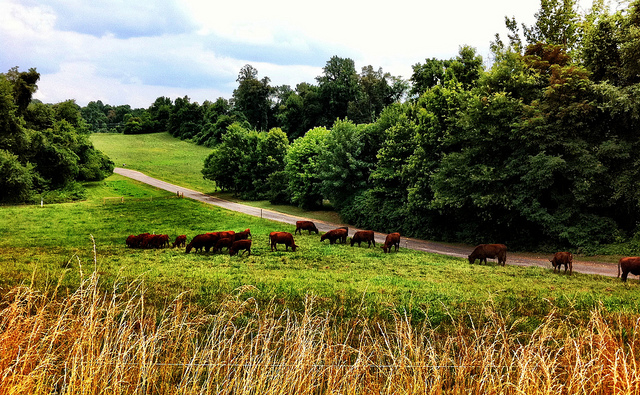
But I took a step back… What does the “grass-fed” label really mean? My research into food labeling regulations has opened my eyes, and the more I’ve learned, the more I’ve come to suspect that many (most?) labels are just full of crap (and frankly downright insulting at times). So I mentally added a “Research Grass-Fed Meat Labels” task to my to-do list and did some analysis for all of us.
How the USDA Defines “Grass-Fed”
The USDA’s 2007 voluntary standard, “United States Standards for Livestock and Meat Marketing Claims, Grass (Forage) Fed Claim for Ruminant Livestock and the Meat Products Derived From Such Livestock“, governs grass-fed claims using the following criteria:
- Animals must eat only grass and forage throughout their lives, except when consuming milk before weaning. They can’t eat or be fed grain or grain byproducts, but food from cereal crops in the vegetative (pre-grain) state is ok.
- They must have “continuous access to pasture during the growing season.” The growing season is defined as the time between average last frost and average first frost in the animal’s locale. During winter months or drought conditions, they must continue to eat only grass and forage — no grain.
- Animals may be given routine mineral and vitamin supplements. Producers have to document anything not considered routine.
How the USDA’s Grass-Fed Standard Works
Under the standard, producers must obtain a USDA evaluation prior to using the grass-fed label or marketing a product as grass-fed. Evaluation procedures are documented in the USDA’s Quality Systems Verification Programs (QSVP), a pre-existing set of programs designed to “provide independent verification that special processes and/or marketing claims are clearly defined and verified by an independent third party.”
What the Standard Doesn’t Tell You
The “access to pasture during the growing season” requirement means that animals could be confined to pens or feedlots during much of the year. Additionally, producers who had been previously certified under the USDA’s QSVP requirements were grandfathered in on the grass-fed label. Any farmer using the term “grass-fed” before the 2007 standard was created can continue to use it, whether he now complies with the standard or not.
My Takeaways
The grass-fed label appeals to me because I want my food to come from animals that were raised under natural conditions, particularly now that I know the horrific truths about how much of our meat is produced. And I want to support ranchers and companies that feel the same way I do. But I won’t blindly believe that “grass-fed” implies all that.
I did some research on Safeway’s Open Nature grass-fed beef and have no reason to suspect its meats aren’t produced in line with my interests. Its website states its animals are humanely and sustainably raised, vegetarian-fed, and free of antibiotics, hormones, and preservatives. This is refreshing and inspiring to see from a major supermarket chain. Will I buy it? Maybe, maybe not. I love supporting my local grass-fed beef producer, but he’s not always down the street waiting for me to drop by and pick up a Friday night steak. I like having options. I will most likely give this meat a try.
Here’s what’s really cool to me: If I do buy this product, it will be with open eyes. It’s powerful to be able to hit the web, do a bit of research, and find a wealth of reliable sources that empower us through information. Way to go, researchers, scientists, consumer advocates, educational groups, writers, and food lovers.
Are You Obsessed With Food Labels Like I am?
Here are a few posts you should check out:
- Don’t Be Leanwashed: Five Food-Words That Should Be Banned
- What Do Those Egg Carton Labels Really Tell You? (Infographic)
- Blog Action Day: What Do Meat Labels Really Mean?
- Food Labels for Ecovores: Avoiding Hidden Animal Ingredients
- Food Label Fact and Fiction
Would you buy Open Nature’s grass-fed beef based on what I’ve learned? Share your thoughts.
Image Credit: krossbow via flickr/CC

















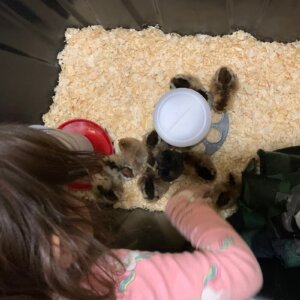






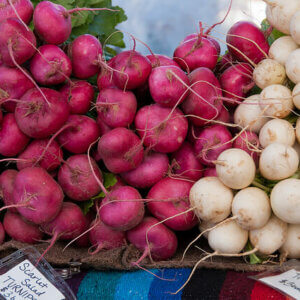




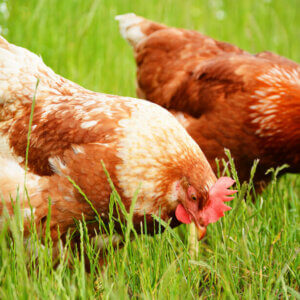










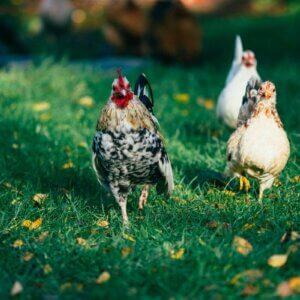
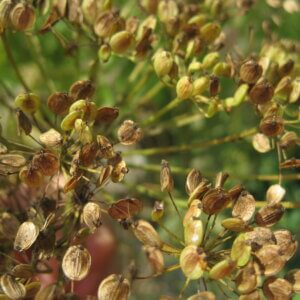
I’ve been quiet a long time but need to comment on grass fed labeling etc. Vegetarian diet does not mean grass fed, corn, soy, and all grain is vegetarian. For once I agree with the government! I think the definition of grass fed in the federal register for labeling requirements is correct. According to it and in my opinion grass fed means just that, only grass. The American Grass Fed Association (AGA) also has a definition. But once again, contrary to my definition, it allows for supplementation with a number of non forage products including cottonseed and its byproducts, peanuts its byproducts, and others . Feeding these is not allowed according to USDA grass fed.
I was recently questioned by a consumer on the true definition of grass fed and her concern after reading the AGA standards on their website. Following up on that conversation I wrote a letter to the president of the AGA expressing my disagreement with the feeding practices allowed. I received a reply defending it for various reasons. Since that exchange the standards have disappeared from their website. We have to be transparent to retain the trust of the consumer. Case in point “pink slime”. The product may be perfectly safe but the fact it was kept quiet and not on labels allowed for a press feeding frenzy when it was “exposed”. Being on the defensive is not a real good marketing plan. We need to tell the consumer what our product really is and let them decide. Its that simple.
The drought of the last 2 years has separated the men from the boys and the women from the girls in this business and the only ones that have survived are the really good pasture managers and the cheaters. The only way to really know what your buying is to know where and by whom your meat is produced and have faith in their values.
Unfortunately when the “major” chains get in the business this gets difficult. The grass fed at Safeway is imported from Australia as is the case at Sprouts. Whole Foods used to supplement their locally produced products with imports. I do not know if they still do or not because the recently implemented country of origin labeling laws also have a few loopholes. It might be a little difficult to have a relationship with some rancher 8000 miles away.
In conclusion that label may say “USDA grass fed”, ” AGA approved”, “vegetarian”, “no antibiotics” etc. etc. etc. but I think a customer would put a little more faith in what I tell them about MY product than all of the above. Lets face it, I have a lot more blood, sweat, tears and reputation at stake than a lot of the people in the ivory towers.
Jon, Thank you so much for your comments. I’ve started buying beef from a local rancher at the farmers market, so I appreciate your comments about having a relationship with the person you’re buying your food from. Turns out, I am your neighbor! I live in North Dallas, and I’m pretty sure I’ve bought your beef at Urban Acres. Unfortunately, I don’t get down there very often, but I will seek you out. Thanks for doing what you do to give us healthier food options.
I have been buying the grass fed beef after I had read their website on the meat. They seem to be doing it the way I prefer nd you’re right, the meat isn’t much more expensive than regular beef. Its color always appears more natural to me and the taste is wonderful. Thank you for sharing your info 🙂
I just spoke with Safeway and they say their Open Nature Grass Fed beef is 100% grass fed. When they don’t have grass, they buy it and ship it in. No grains whatsoever…. and this meat is fairly tasty too.
OK, but I’m sure they will say that and maybe it’s true. Just remember that 100% grass-fed may still mean that for most of the year the beeves are kept in pens and fed grass ie., not ranched or live on a range. Also they may not be local – could be meat shipped in from New Zealand or anywhere else. I am going to stick with buying from PCC when I need meat more quickly. Long term stocking up comes from a local rancher in Ellensburg that I know. Try Windy N Ranch run by the Newhall family. They are great and you can visit their ranch anytime.
The problem for me is that even if they are out on pasture (grass fed and grass finished) they were probably using chemical fertilizers and also chemical weed killers.
To be good meat, it need to be organic grass fed/grass finished.
I see your name is “Oregon Rancher”. I’m looking for somebody local (at least in Oregon) to buy organic grass fed meat from. Do you have a ranch, or can you recommend one?
theres a guy up in battle ground, john (cant rememeber his last name), his butcher vacuum seals too. we bought a half a cow from him when we lived there. good stuff.
Thanks!
Basket Flat Ranch in Battleground! 100% grass-fed – I believe that is the John that the other commenter is mentioning.
Honestly, I am wondering why in the world a cattle rancher would bother with the expense of fertilizing and using herbicide on grazing fields? My father is a farmer and he doesn’t. He only sprays his beans.
Heading east on the 23rd have to check out Windy N Ranch. I recently bought 4 pks of Safeway Open Nature Grass fed Angus beef. Wow so upset. I know how to cook and make tough cuts tender. My 2 steaks, tough. My London Broil, a smidge tender but dry as could be. Ground beef was good. Never again.
Just so you know, in the United States there was a grandfather law for any farms before 2007 that even if they are not actually grass feeding anymore, if they were prior to that year their meats are considered “grass fed”.
Look it up. And it’s labeled like that regardless of it even not being that way.
So we truly can’t believe anything we eat. Our foods run by a government that straight out lies.
I also did some digging with Safeway’s new grassfed meat lines. They actually use two suppliers in SW Washington state where I shopped. The meat clerk pulled the packages from the freezer to see who the suppliers were. One was some co-op who I could not track down at all. Then they had this New Zealand supplier. I went to their site and NOWHERE on the site does it say it is 100% grassfed. I even emailed one of their executives about this and NEVER heard back. I also left a phone message for the meat buyer for Safeway for our area and he never called back. I am not that impressed so far. Yes they have these flyers strategically placed in the meat counter pushing this but my guess is like so many who are pitching grassfed they are grassfed to some point but the last 60+ days they are stuffed with corn etc like all beef. Technically they aren’t lying just not telling the whole truth. I also found this to be true of Chuck’s Produce when I checked into their grassfed a few years back and have not been back since. I really don’t like it when they misrepresent it and can’t trust ANYTHING they say. Big food needs to think about their credibility here. If neither Safeway nor their suppliers can respond to simple questions then I have a big problem. When they can’t put it in print they are 100% grassfed on their website that is a clear red flag. My hope is that the new Walmart that is being built just down the road from this Safeway will put this Safeway out of business. We have already seen a local Albertson’s close this year. For years Safeway overcharged on food and then Winco ate up their market share in huge bites, they still didn’t pay attention to this nor did they drop their prices. But now that Walmart is building down the road their prices are starting to drop. Also the store is not that fancy and just run down and dirty dirty dirty. It looks fancy and full up to the ears with processed food offerings and the lights are low trying to give some ambiance so folks don’t see how dirty the place and the carts are. We used to shop there for years until we found Winco (employee owned) and these stores are always busy and the parking lots are always way more full. For meat you may want to check out Cash and Carry and buy in 15lb packages. Some of their suppliers are pretty good too. All meat goes up in price in the summer like gas does since they know you want to BBQ. Right now unless you want to buy directly and pay a lot or buy from Whole Foods etc and pay a lot will you find real grassfed. No big retailer has really brought affordable grassfed to stores yet. I feel like there is some serious price fixing going on now and may have to just find a rancher to sell to me directly.
Why would you want Walmart to put Safeway out of business??? Walmart destroys communities and does far more damage than a dirty Safeway IMO. Based on ignorant comments about Walmart, it leaves doubt as to your research capabilities on grass-fed meat. Also, grass-fed meat is expensive, period, whether it is from Whole Foods or from a rancher. Now, I don’t know if Safeway’s grass-fed is 100% grass-fed, which is how I ended up on this site, but I do know Walmart is awful. Might as well post an ad for Monsanto while you’re at it… Just saying.
Hey you need to realize not everything they do is evil. When we had to go gluten free many years ago it was WALMART that made the huge decision to actually disclose gluten on their in house brands. It wasn’t Safeway. They were the first chain to actually make a commitment to consumers. It also wasn’t Whole Foods. This made a huge impact on the grocery business. That is when General Mills decided to try one brand of Chex cereal gluten free and found out they couldn’t keep it on the shelves. I would have to buy several boxes at a time to make sure we had them on hand since many times it would be sold out. Now gluten free is a BILLION dollar industry. At the time it was not and I was treated very poorly by grocery chains and food manufacturers who would tell me we weren’t in high enough numbers to justify them bothering to actually disclose the gluten let alone take it out. After Walmart made this decision to disclose it was at this point that everyone decided to take gluten seriously in labeling. It may not be a big deal to you but it 1 in 133 American are Celiac and then there is a whole spectrum of gluten sensitive folks so yeah it made a HUGE impact for millions of consumers. Name calling people ignorant is just ignorant. Your post should be removed since you are clueless about the whole topic and you prefer to do name calling than to actually have a conversation on this. We have several health problems associated with food and that is where I have to focus and do my homework. We do not eat GMOs either. What is that term when you assume wrongly? A** your opinion means nothing. Just say it somewhere else buddy. None of these grocery chains are great but I try to utilize them the best I can as a consumer. The grocery business is a tough one and none of them are saints. Not a one. Your self righteous position is just foolish. I did look further into the Safeway meat and found I could not confirm their claims with the vendors. With most Americans struggling, Walmart is a necessary evil right now for a lot of Americans. Maybe you can afford to shop at Whole Foods but most American can’t. That is why they do so well. You must live in a bubble.
Thanks for an EXCELLENT article! You’ve saved me lots of time. By the way, I did research on the organic meat sold by Costco and it checks out. I went to the website and viewed comments their and found that although their meat was not produced locally, it was produced to my standards, which is very similar to yours, ie., treated humanely and the animals were ranched rather than penned.
I just bought some Open Nature beef from Safeway. The package says that it is grass fed, raised without antibiotics or hormones and is from Australia. I trust them more than US beef suppliers and Australia has strict humane, regulations even for feedlot animals. I don’t think the US even has regulations once animals reach feedlots. It may not be the perfect choice but it’s better than US CAFO beef when I can’t find perfect 100% grass fed, organic beef.
Awesome article! I couldn’t find any labels saying “100% grass fed”. They all say “grass fed” and they also say “vegetarian diet”… My thinking is they might have changed it or someone working for safeway is posting that it is “100% grass fed”. Since it only says “grass fed” I wouldn’t eat this meat. It must say “grass finished or 100% grass fed” . Also a vegetarian diet does mean they can still feed corn…just not the grounded up dead cows and whatever else they can get away with feeding the animal’s. Remember safeway is in business to make money and those sneaky bastards are probably full a ton of people by their tricky wording.
thank you for your important and helpful community service, in researching this grass-fed info and presenting it to us “savvy shoppers”. It’s interesting to me, from the comments, that people are getting different information from different safeway stores. I realize that it will still be important for me to personally check out my own safeway store, which I don’t normally shop at cuz previously I hated their meat and I hate the low lighting.
I need to see grass fed grass finished on the label. If the beef is finished on grain it doesn’t matter if it was grass fed. The grain ruins the omega fats which are good for you and a full Paleo diet. Grass fed grass finished is more like fish with the good fats.
Glen
Vegetarian fed could be, and probably is, GMO soybeans or corn. No way am I putting that into my body. This is no better than Commercial Feed Lot animals.
Mary, thanks for your article. I was suspicious of the labels but now I know what they mean.
However, I would like to warn you about believing whatever a marketing department puts on their website. (And also a couple suggestions when researching brands.) They can use any terms they like virtually unregulated, or get some certification in which they pledge to follow certain standards…and as John pointed out, anyone who previously used the term “grass-fed” can continue to use it!
To wit, you said, “I did some research on Safeway’s Open Nature grass-fed beef and have no reason to suspect its meats aren’t produced in line with my interests. Its website states its animals are humanely and sustainably raised, vegetarian fed, and free of antibiotics, hormones, and preservatives.”
Notice it doesn’t even SAY “grass-fed”!
John pointed out that “Vegetarian diet does not mean grass fed, corn, soy, and all grain is vegetarian.”
Also, when it comes to enforceable standards, he said, “The grass fed at Safeway is imported from Australia as is the case at Sprouts…country of origin labeling laws also have a few loopholes.”
That means distributors can get around USDA inspections by buying beef from elsewhere. What are Australia’s laws? I have no clue.
But here is a suggestion when looking for meat…find out what the brand-name REQUIRES from its farms in terms of ACTUAL CONTRACTS, PROHIBITIONS, and INSPECTIONS.
For example, Verde and Strauss have extremely strict standards, including inspections and blood tests, pre-authorization for ANY medications, etc. The only gripe I have is allowing cows to graze on post-harvest corn stalks in the fall (though if I remember, that was for lactating cows), only because I know 50-70% of “organic” corn is grown from contaminated seed which was cross-pollinated during production, and a large portion of that is Monsanto’s seed which produces AGENT ORANGE throughout the plant. It’s not as bad as eating the corn itself (MAYBE), but how does that affect the cattle’s tissues and fats?
Verde and Strauss specialize in the grass-fed/pasture-raised industry, and their applications (and in one case the entire contract) is downloadable from their website. You can see exactly what rules and inspections ranches must agree to.
Open Nature made me suspicious when a friend told me about it a few weeks ago, because the supermarket chain had it on sale for ONLY $2 PER POUND! Highly suspicious.
Unfortunately, it costs about $8 per pound for Verde, and I can’t really afford it, but I’m very careful overall with my budget so I can make these decisions where it counts. I know what I’m eating, and even the taste of the juices (fat) is excellent!
I’m still not convinced. I want to know why it’s not “100% Grass Fed” like other labels. I’m feeling tricked.
THIS ACTUALLY IS THE VERY VERY BEST GROND MEAT ONE CAN BUY….SUSPICIOUS AS WELL AT FIRST…BUT WHEN YOU EAT TI …IT IS UNBELIEVABLE.beyond GOOD!!
FAR SURPASSES THE GRASS FED GROUND MEAT FROM SPROUTS WHICH IS EXTREMELY GOOD, I MEAN SPROUTS MARKET GRASS FED MEAT IS BETTER THAN ANY SUPERMARKET, BUT DOES NOT REACH THE LEVEL OF THE OPEN NATURE BRAND. MOST OUTSTANDING FARM PRODUCTS DO COME FROM AUSTRALIA, LIKE THEIR PASTURE FREE EGGS…OF COURSE IT IS GOING TO BE MORE EXPENSIVE…BUT ONE GETS WHAT ONE PAYS FOR!
IN LOS ANGELES, ALBERTSONS AND VONS DO SELL IT.
Do not feel tricked! it is the very bet meat I have ever eaten, and the package does say it is grass fed!
I’m suspicious when it says “Grass Fed” but not “Grass Finished”. I’ve lived near feed lots and just don’t want to feed into that industry. I also don’t want to eat a bunch of grain, unless it is the grain itself, which I mostly avoid. Inflammation has been a bane to our health and the USDA food pyramid is just feeding pockets of industries. Being closer to food sources is enlightening.
Support the neighborhood, even if it’s inconvenient…trying to live local.
Thanks for the post.
I thought that having a diff. name at Jewels in the meat section was great. I never buy their meat and usually buy anything that has a label on it.
But was I surprised today after taking out my LAMB shoulder steaks, that by the time I trimed the fat and the HUGE bones, I had more junk that I have with reg. lambchops. There were so many bones in the meat, I barely had enough for one person. Never seen anything like that before and was VERY disappointed. Lamb is my favorite and I cook a lot of it, but this was really a pain.
I bought the stew meat, scarcely a drop of fat, the one that says from Australia. And it’s about 7. pound, compared to the usual 10. (organic)(more fat). My raw beef feral cats love it. They don’t like fat, or regular Angus from another grocer.
Watch the documentary “Dominion” on YouTube.
thank you for the wonderful article. This tells a lot about grass fed meat.
Hi! I came across this blog because I have also been buying these products at Safeway for some time, but due to recent packaging and labeling changes I am seeking more information… Namely, the new packaging on the Open Nature grass-fed beef no longer states that it raised/processed in the US as of very recent. So now I am trying to find out where it is coming from… Anyways, just thought I’d bring it to the attention of folks that were already talking about it!
For those already buying grass fed beef from Safeway, make sure to note that O Organics is labeled as “Grass Fed” (meaning that it may well be – probably is – grain finished. Only the Open Nature brand is labeled as “100% Grass Fed”.
For those within reach of the Central Willamette Valley in Oregon, check out Oregon Valley Farms. You can find them on line or at a ‘warehouse’ pick up point in East Albany. 100% grass fed, locally raised and processed. Good stuff! But you will pay more than the prices you find at Safeway.